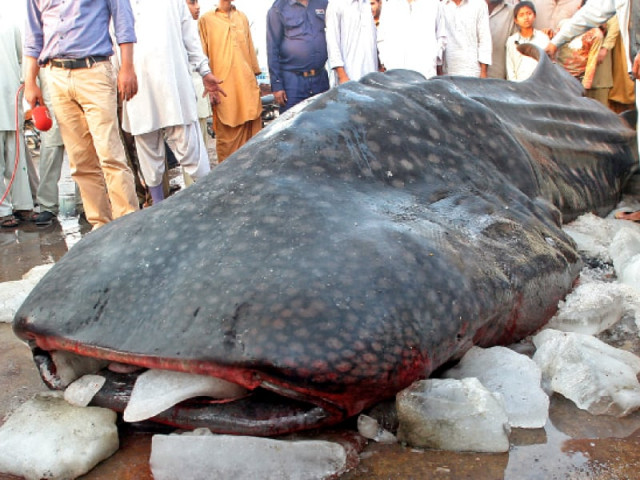‘It is not easy being a whale in any society’
15 whale and dolphin experts gather at a workshop on conserving cetacean species.

The whale shark that was dragged to the fish harbour on February 1 has been stuffed with ice to slow down the rate of decay. There are no wounds on its body and the cause of its death has yet to be determined. PHOTO: ATHAR KHAN/EXPRESS
The whole point of having free and fair elections was to create a country where every species, and not just the two-legged enfranchised ones, can feel safe. Three organisations with a unique vision took the first step to this end on Wednesday.
Fifteen whale and dolphin experts presented their views at a workshop on ‘Developing strategy for Cetacean Conservation in Pakistan’ organised by World Wide Fund-Pakistan (WWF-P), National Centre for Maritime Policy Research, Bahria University, and Pakistan Whale and Dolphin Society.
Cetaceans are aquatic mammals and they include whales, dolphins and porpoises. As many as 19 cetacean species have been found in Pakistan one of which is the blind Indus dolphin found only in the River Indus and some of its tributaries.
The experts agreed that the various stakeholders, including academia, research institutions, government organisations and fishermen communities, needed to collaborate to protect biological diversity. “Fishing operations, including the uncontrolled use of gillnets, are a major threat for dolphins and whales,” said Technical Advisor Marine Fisheries Muhammad Moazzam Khan.

According to Khan, the increased pollution levels and the degradation of habitats had wiped out dolphins from many areas along River Indus and Karachi’s coast. He felt that the uncontrolled increase in fishing fleets and the use of invisible, and therefore more efficient, fishing gears were a big threat to fish and whales. “The ocean is alive if dolphins and whales are alive.”
Khan told The Express Tribune that the world’s largest animal, the Blue whale, and the one of the smallest marine species, the finless porpoise, were sighted in Pakistan. He felt that people would protect these species if they were made aware of their existence.
Abandonment issues
“Young animals are more adventurous and often they are not familiar with the ocean’s geography,” said Shoaib Kiyani, a researcher at Karachi University’s Institute of Marine Biology, while explaining why fish and whales were found stranded on Pakistan’s coast. He explained that they swam to the shore due to a number of other reasons as well, including suffering from bacterial infections, getting caught in fishermen’s nets, seismic and naval activities, the pull of the earth’s magnetic field, social ties and if they were lost while moving with their families. “It is not easy being a whale in any society,” Kiyani told the audience burst into laughter. “Life is not tip-top for them.”
Doomed dolphins
“There are about 1,300 dolphins living in River Indus and 137 cases of stranded dolphins were reported between 1992 and 2012,” said Uzma Khan, the director of biodiversity department at WWF-P.

“About 103 of the stranded dolphins were successfully rescued and 34 of the stranded dolphins died.” She pointed out that the dolphin population in Indus has risen marginally in the past and they have always been under threat.
“It is important to create a plan of action to save whales and dolphins due to their ecological, biological and aesthetic importance,” said the director of WWF-P, Rab Nawaz.
He stressed on the need to collect data to create awareness about cetacean species in Pakistan and to ensure that they didn’t get caught in fishing gear.
“We also need to improve and implement legislation on protecting whales and dolphins.”
The speakers agreed to work out a national plan of action to protect whales and dolphins and to address all the threats they faced.
Published in The Express Tribune, May 24th, 2013.



















COMMENTS
Comments are moderated and generally will be posted if they are on-topic and not abusive.
For more information, please see our Comments FAQ